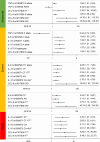Association of pro-inflammatory and anti-inflammatory cytokine polymorphisms with COVID-19 severity in unvaccinated patients
- PMID: 40881695
- PMCID: PMC12380819
- DOI: 10.3389/fimmu.2025.1641285
Association of pro-inflammatory and anti-inflammatory cytokine polymorphisms with COVID-19 severity in unvaccinated patients
Abstract
Background: Cytokines and chemokines are essential for establishing an appropriate immune response to severe acute respiratory syndrome coronavirus-2 (SARS-CoV-2). Variations in the genes encoding cytokines and chemokines strongly influence the immune response to pathogenic challenges and disease outcomes. This study was conducted to investigate the associations between polymorphisms in the TNF-α, IL-6, IL-8, IL-10, and CCL5 genes and COVID-19 severity.
Methodology: We performed a cross-sectional study with a total of 627 unvaccinated COVID-19 patients were classified according to WHO disease severity. We evaluated the levels of IFN-α, IFN-γ, TNF-α, IL-1Ra, IL-2, IL-6, IL-7, IL-10, CCL2, CCL3, CXCL8, CXCL10 and GCSF in the serum and compared them among COVID-19 severity groups by Kruskal-Wallis test and stratified by polymorphism alleles. A logistic regression was performed to determine the association of the polymorphism and COVID-19 severity.
Results: This study revealed a significant increase in IL-2, IL-6 and CCL-2 levels in the deceased group. However, the IL-10 levels were higher in the moderate group than in the mild group. Logistic regression analysis revealed that five polymorphisms were associated with a higher risk of severe COVID-19: the TNF-α (rs1800610) A allele (OR=1.50; 95% CI: 1.01-2.24); the IL-6 (rs1800796) C allele (OR=1.64; 95% CI: 1.05-2.57); the IL-10 (rs1800871) T allele (OR=1.94; 95% CI: 1.24-3.04) and (rs1800872) A allele (OR=1.87; 95% CI: 1.21-2.89); and the CCL5 (rs3817656) G allele (OR= 1.64; 95% CI: 1.02-2.65).
Conclusion: Patients infected with SARS-CoV-2 who have the TNFα gene variant (rs1800629) are protected from developing COVID-19 moderate and severe outcomes, as well as from presenting low concentrations of some pro-inflammatory cytokines and chemokines. However, carriers of the IL-10 (rs1800872, rs1800871) and CCL-5 (rs2107538) gene variants were associated with patients who died from COVID-19. Of these, only the minor allele of CCL-5 was primarily associated with increased chemokines levels, as well as with some cytokines considered hallmarks of the cytokine storm.
Keywords: CCL-2; COVID-19; IL-10; IL-6; SARS-CoV-2; polymorphism.
Copyright © 2025 Martínez-Gómez, Oropeza-Vélez, Almonte-Becerril, Chavez-Galan, Martinez-Armenta, Vidal-Vázquez, Ramírez-Hinojosa, Vázquez-Cárdenas, Gómez-Martín, Vargas-Alarcón, Rodríguez-Pérez, Ramón-Luing, Flores-Gonzalez, Carrasco, Cruz-Bautista, Mata-Miranda, Vázquez-Zapién, Martínez-Cuazitl, Parra-Torres, Martínez-Ruiz, Zayago-Angeles, Ordoñez-Sánchez, Segura-Kato, Suarez-Ahedo, Olea-Torres, Herrera-López, Pineda, Martínez-Nava and López-Reyes.
Conflict of interest statement
The authors declare that the research was conducted in the absence of any commercial or financial relationships that could be construed as a potential conflict of interest.
Figures


References
-
- Yessenbayeva A, Apsalikov B, Massabayeva M, Kazymov M, Shakhanova A, Mussazhanova Z, et al. Biomarkers of immunothrombosis and polymorphisms of IL2, IL6, and IL10 genes as predictors of the severity of COVID-19 in a Kazakh population. PloS One. (2023) 18:e0288139. doi: 10.1371/journal.pone.0288139, PMID: - DOI - PMC - PubMed
MeSH terms
Substances
LinkOut - more resources
Full Text Sources
Medical
Miscellaneous

